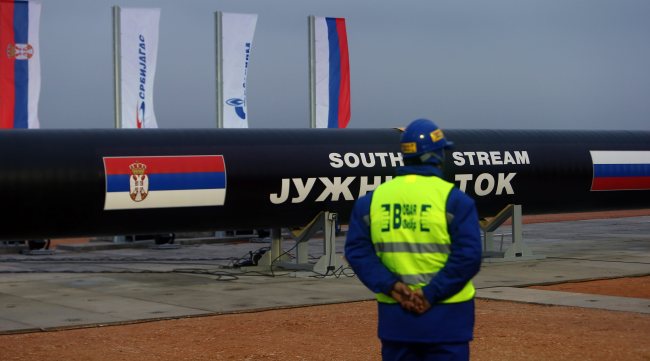BRUSSELS -- Europe played down Tuesday an angry Russia’s shelving of the multi-billion-dollar South Stream gas pipeline project, saying it merely reinforced the need to find other energy sources amid the crisis in Ukraine.
President Vladimir Putin unexpectedly announced during a visit to Turkey on Monday that he was closing the scheme to pump Russian gas to southeast Europe, blaming Brussels for making it impossible.
The pipeline has become the latest casualty of the new Cold War between the West and Russia over Ukraine, with Brussels increasingly keen to wean the EU off its dependence on Moscow’s fossil fuels.
The European Union defended its position on Tuesday, saying that in its current form the South Stream pipeline breached its rules and that any such project on its territory must respect them.
“The decision announced by Russia shows it is urgent not only to diversify the routes but also the sources of energy for the EU,” EU foreign policy chief Federica Mogherini told reporters before meeting NATO foreign ministers.
A scheduled EU meeting on South Stream on Dec. 9 would go ahead as planned despite the Russian announcement, Mogherini added.
Pipeline ‘broke EU rules’
The pipeline was to bypass crisis-hit Ukraine, flowing underneath Turkey‘s waters in the Black Sea and through the Balkans, crossing Bulgaria, Serbia, Hungary and Slovenia and then Austria to connect with the main European pipeline network.
But Bulgaria, once a strong backer of the project, changed its mind on the pipeline in June after the EU said Sofia had breached the bloc’s competition rules by the way it awarded contracts for its leg of the pipeline.
Putin said on Monday, at a news conference alongside Turkish President Recep Tayyip Erdogan in Ankara, that “in the current conditions Russia cannot continue with the realization of this project.”
 |
A worker stands next to steel pipes during the ceremony marking the start of the construction of the South Stream gas pipeline at a field north of Belgrade, Serbia. (EPA-Yonhap) |
Russian state gas giant Gazprom said it had instead signed an agreement on constructing an offshore pipeline across the Black Sea towards Turkey, the second biggest European-area importer of Russia gas after Germany.
The EU refused to say whether it believed Putin -- or Gazprom boss Alexei Miller who said: “That’s it, the project is closed.”
“To comment on whether South Stream is dead or not is not really for us to do,” said Anna-Kaisa Itkonen, an energy spokeswoman for the Commission.
The pipeline row is crucial because despite relations being at their worst since the Cold War, the EU gets about a third of its gas from Russia, with some Eastern European nations almost totally reliant on it.
Around half currently transits through Ukraine, and just last month the EU brokered a deal between Moscow and Kiev to resume gas deliveries halted by the crisis and ensure warmth for European homes.
Bulgaria rejects blame
South Stream would have removed the Ukrainian headache for Russia, but Brussels was less keen, seeing a need to look for other sources of energy away from the growing threat on its borders.
Bulgaria’s European Commission vice-president Kristalina Georgieva suggested that Putin‘s announcement had more to do with politics than the EU’s rules.
“The construction of pipelines should correspond to EU rules,” she said.
“This position is clear but it is in place for quite some time and it cannot be the reason for this decision” by Russia.
Bulgaria‘s president Rosen Plevneliev on Tuesday rejected any responsibility for Putin’s decision.
“It is clear to everyone that South Stream is not a project only between Russia and Bulgaria but between Russia and the EU... The decision is entirely in the hands of Russia and the European Union,” Plevneliev said.
The EU shot back that South Stream was a matter between Russia and individual member states, while adding that Bulgaria would not be entitled to any compensation from Brussels for the project‘s failure.
Hungary was meanwhile looking at alternative sources of gas including Azerbaijan “in order to secure Hungary’s long-term energy supply”, Foreign Minister Peter Szijjarto said Tuesday. (AFP)








